Past the sandbags and anti-tank obstacles in Jenin refugee camp in the occupied West Bank, theater director Mustafa Sheta ponders the fate of Palestinian thespians.
“We are under a very abnormal situation,” Sheta told reporters at the camp’s Freedom Theatre.
The streets were silent that day last month as residents had called a public strike to protest Israeli forces killing a 16-year-old Palestinian girl in Jenin hours earlier.
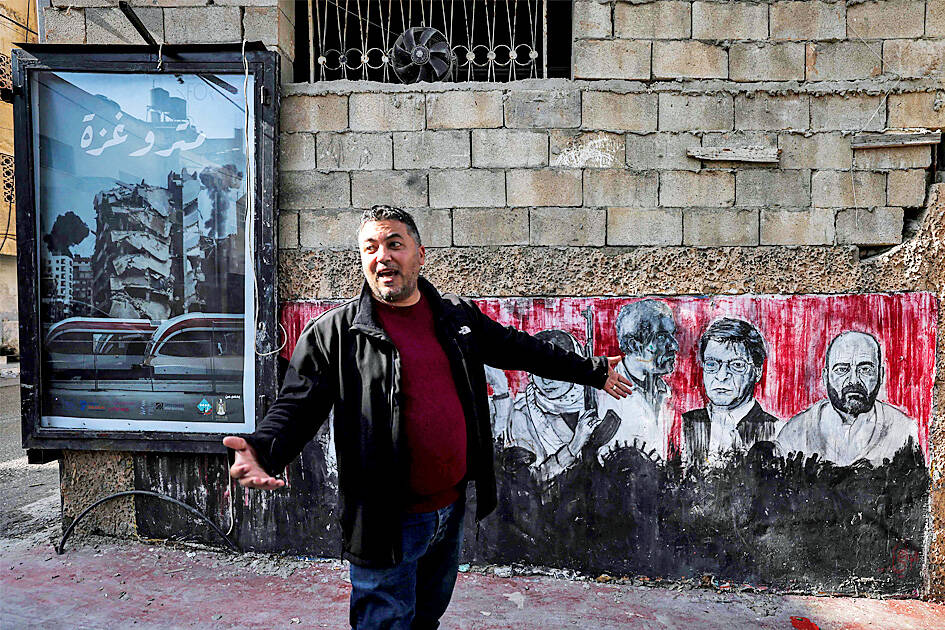
Photo: AFP
With Israeli forces raiding Jenin repeatedly in the past few months, engaging in gunfights with Palestinian militants, the Freedom Theatre’s ability to provide residents with respite has been under growing strain.
In 2011, the theater’s well-known Israeli-Palestinian director Juliano Mer-Khamis was gunned down in Jenin’s refugee camp, in an attack that remains unsolved.
Other Palestinian cultural institutions across the West Bank, annexed east Jerusalem or Israel also face many obstacles.
“It’s not like you have a clear plan in your schedule... You need to prepare for different scenarios,” said Sheta, 42.
Ahead of the opening night of the theater’s latest production, Metro Gaza, the creatives woke up to find three Palestinians had been killed in an Israeli operation.
“What can we do? Can we continue, or stop, cancel the show?” Sheta said.
The actors took to the stage as planned and an audience of about 75 filled half the stalls.
Yasmin Shalaldeh, 30, a Jerusalemite who plays a Gazan girl in the show, said it was “essential to keep on working,” particularly in Jenin.
More than 40 Palestinians were killed last year during Israeli operations in the Jenin area, including militants, children and a teenager involved in the theater’s youth programme who was shot dead in November.
After Jenin, Metro Gaza went on tour to Ramallah, east Jerusalem and finally Haifa in northern Israel.
Each playhouse faces its own challenges and Jerusalem’s El-Hakawati, also known as the Palestinian National Theatre, has seen its audiences dwindle since Israel began constructing a barrier around the West Bank in the early 2000s.
“After the wall and the checkpoints, [it] started to get less and less, people cannot come,” said director Amer Khalil, as the sound of children enjoying a puppet show drifted into the room.
Whether living in Jerusalem, the West Bank, Israel or the blockaded Gaza Strip, Palestinians hold different papers which impact the ability of theater casts and audiences to travel.
“It’s torture,” Shalaldeh said. “When you have a play in Jerusalem and you send it to someone from Gaza and they want to come, they can’t.”
Long gone are the days when directors must submit their script to Israeli censors, yet the theater is “threatened by other things,” Khalil said.
Decorated with posters of past productions, El-Hakawati’s foyer bustles with Jerusalemites ahead of each new performance.
However, the director described a “very, very, very difficult — critical — economic situation,” with ticket sales not even covering one-third of running costs.
El-Hakawati cannot receive any support from the Palestinian Authority, which is banned by Israel from operating in Jerusalem, leaving it to “live on donations” largely from European states, Khalil said.
“Like the whole world, you have a national theater and ... the running costs — electricity, water, taxes — are all paid by the government or by the municipality. And this is what we don’t have here,” he said.
For Al Saraya, a theater in the coastal city of Jaffa that receives state funding from Israel, such support is far from unconditional.
Mahmoud Abu Arisheh, its 34-year-old director, said the theater’s mission is to celebrate “the richness and uniqueness of the Arab culture.”
In November, then-Israeli minister of finance Avigdor Lieberman called on authorities to take “all the available measures, including denying funding” when Al Saraya screened Farha, a film depicting alleged Israeli atrocities against Palestinians.
Abu Arisheh said threats and incitements against the theater “are already limiting our freedom of speech and expression.”
Sanctions by Israeli authorities “could happen at any time,” the director said.
However, Palestinian artists, whether in Jaffa, Jenin or Jerusalem, must keep the show going, Shalaldeh said.
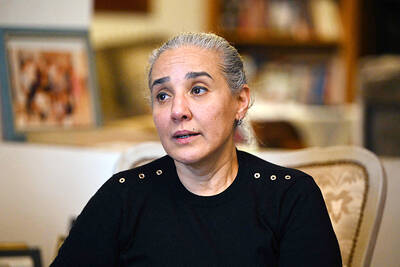
Tunisian President Kais Saied yesterday condemned a European Parliament resolution on human rights calling for the release of his critics as “blatant interference.” The EU Parliament resolution, voted by an overwhelming majority the day before, called for the release of lawyer Sonia Dahmani, a popular critic of Saied, who was freed from prison on Thursday, but remained under judicial supervision. “The European Parliament [resolution] is a blatant interference in our affairs,” Saied said. “They can learn lessons from us on rights and freedoms.” Saied’s condemnation also came two days after he summoned the EU’s ambassador for “failing to respect diplomatic rules.” He also
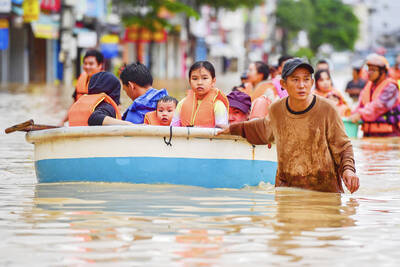
Tropical Storm Koto killed three people and left another missing as it approached Vietnam, authorities said yesterday, as strong winds and high seas buffeted vessels off the country’s flood-hit central coast. Heavy rains have lashed Vietnam’s middle belt in recent weeks, flooding historic sites and popular holiday destinations, and causing hundreds of millions of dollars in damage. Authorities ordered boats to shore and diverted dozens of flights as Koto whipped up huge waves and dangerous winds, state media reported. Two vessels sank in the rough seas, a fishing boat in Khanh Hoa province and a smaller raft in Lam Dong, according to the
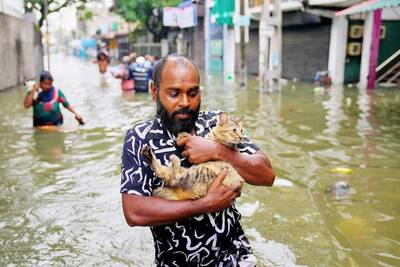
Sri Lanka made an appeal for international assistance yesterday as the death toll from heavy rains and floods triggered by Cyclone Ditwah rose to 123, with another 130 reported missing. The extreme weather system has destroyed nearly 15,000 homes, sending almost 44,000 people to state-run temporary shelters, the Sri Lankan Disaster Management Centre (DMC) said. DMC Director-General Sampath Kotuwegoda said relief operations had been strengthened with the deployment of thousands of troops from the country’s army, navy and air force. “We have 123 confirmed dead and another 130 missing,” Kotuwegoda told reporters in Colombo. Cyclone Ditwah was moving away from the island yesterday and
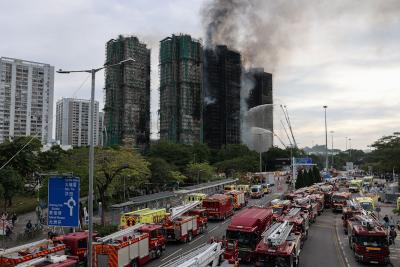
Firefighters battled one of Hong Kong’s deadliest modern blazes for a second day today, fighting to control a fire that blackened several high-rise towers and killed at least 44 people, with hundreds still missing. Three men from a construction company this morning were arrested on suspicion of manslaughter, and rescue efforts are ongoing. Thick smoke still poured out of the Wang Fuk Court (宏福苑) complex, which houses thousands, in Tai Po (大埔) district, a northern suburb near the border with the Chinese mainland, this morning. The fire that started midafternoon yesterday had spread across seven of the complex’s eight buildings, and